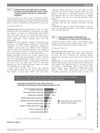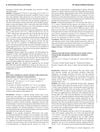 6 citations,
November 2007 in “Archives of Disease in Childhood: Education & Practice”
6 citations,
November 2007 in “Archives of Disease in Childhood: Education & Practice” The document concludes that accurate diagnosis of alopecia in children relies on thorough examination and history, and while treatments exist, none can alter the course of alopecia areata, which can significantly affect a child's psychological well-being.
 4 citations,
August 2018 in “Facial Plastic Surgery Clinics of North America”
4 citations,
August 2018 in “Facial Plastic Surgery Clinics of North America” Platelet-Rich Plasma (PRP), a protein-rich extract from a patient's blood, shows promise in improving hair density, thickness, and quality, but the best method of use and number of treatments needed for noticeable results are still unclear.
 4 citations,
October 2015 in “Journal of Evaluation in Clinical Practice”
4 citations,
October 2015 in “Journal of Evaluation in Clinical Practice” European guideline best for treating hair loss; involve stakeholders and patients for improvement.
 4 citations,
October 2002 in “BJUI”
4 citations,
October 2002 in “BJUI” Finasteride treats hair loss but may affect prostate cancer detection.
 3 citations,
April 2021 in “Journal of Medicinal Chemistry”
3 citations,
April 2021 in “Journal of Medicinal Chemistry” Finasteride may affect PNMT, causing side effects.
 3 citations,
April 2019 in “Journal of Dermatological Treatment”
3 citations,
April 2019 in “Journal of Dermatological Treatment” Caffeine shows promise for treating some types of hair loss, but more research is needed.
 3 citations,
April 2019 in “Journal of psychosexual health”
3 citations,
April 2019 in “Journal of psychosexual health” Women with PCOS often have sexual problems, and treating these issues early can improve satisfaction and reduce healthcare costs.

SLE significantly affects daily life, especially through fatigue and joint pain, highlighting the need for better treatments.
 2 citations,
October 2015 in “Indian journal of science and technology”
2 citations,
October 2015 in “Indian journal of science and technology” SM-215 promotes hair growth by improving the environment around hair follicles.
 1 citations,
June 2023 in “Radiation oncology journal”
1 citations,
June 2023 in “Radiation oncology journal” Low-dose radiation therapy may improve brain function in some Alzheimer's patients and is generally well-tolerated.
 1 citations,
August 2020 in “Food Research”
1 citations,
August 2020 in “Food Research” Plant extracts like Avicennia marina, Boehmeria nipononivea, and Camellia sinensis could potentially treat hair loss with fewer side effects than synthetic drugs.
 1 citations,
March 2020 in “Current Science”
1 citations,
March 2020 in “Current Science” Most people in the surveyed area experience hair loss, but they are not aware of the role of diet, iron, hormones, genetics, and possibly water quality in causing it.
 1 citations,
April 2018 in “SLEEP”
1 citations,
April 2018 in “SLEEP” People with obstructive sleep apnea are more likely to get herpes zoster, but nightmares don't affect the risk.
 1 citations,
July 2018 in “Current Sexual Health Reports”
1 citations,
July 2018 in “Current Sexual Health Reports” Post-finasteride Syndrome causes lasting negative effects, but more research is needed for treatment and risk evaluation.
 1 citations,
January 2018 in “Acta dermatovenerologica Alpina, Pannonica et Adriatica (Tiskana izd.)”
1 citations,
January 2018 in “Acta dermatovenerologica Alpina, Pannonica et Adriatica (Tiskana izd.)” The herbal extract was found to effectively reduce and prevent hair loss without any side effects.
 June 2024 in “International Journal of Advanced Research in Science Communication and Technology”
June 2024 in “International Journal of Advanced Research in Science Communication and Technology” Herbal extracts like Ficus religiosa may help with hair growth and skin rejuvenation.
 September 2023 in “International journal of biomedicine”
September 2023 in “International journal of biomedicine” Minoxidil might help treat acne scars by reducing collagen buildup.
 August 2023 in “International Journal For Multidisciplinary Research”
August 2023 in “International Journal For Multidisciplinary Research” Ayurvedic treatment, exercise, and a healthy diet can effectively manage PCOD symptoms.
 May 2023 in “Journal of drugs in dermatology”
May 2023 in “Journal of drugs in dermatology” Most transgender patients getting laser hair removal before gender-affirming surgery are already on hormone therapy, which might affect the hair removal process.
 July 2021 in “Dermatology archives”
July 2021 in “Dermatology archives” Methotrexate may effectively and safely treat hair loss in children, with notable improvement after 12-15 months.
 June 2021 in “Psychiatria Danubina”
June 2021 in “Psychiatria Danubina” The antidepressant escitalopram likely caused hair loss in a patient.
 March 2021 in “Clin-Alert”
March 2021 in “Clin-Alert” The FDA warned about safety issues with remdesivir and tofacitinib, finasteride is linked to suicidality, potent topical corticosteroids increase osteoporosis risk, henna can cause hemolysis in G6PD deficiency, chemotherapeutic agents can cause adverse reactions, drug interactions are common in cancer patients, ketamine can reduce at-risk drinking, high dose of anticholinergics increases dementia risk in Parkinson's patients, and prenatal exposure to second-generation antipsychotics increases pregnancy complications.
 March 2017 in “Fundamental & Clinical Pharmacology”
March 2017 in “Fundamental & Clinical Pharmacology” The model and estimator can predict drug exposure in kidney transplant patients well.
 April 2015 in “Cambridge University Press eBooks”
April 2015 in “Cambridge University Press eBooks” Many women experience sexual dysfunction, but few seek help, and better treatment and medical training are needed.
The document concludes that current hair loss treatments have limitations and suggests researching new treatments targeting different factors of hair loss.
 April 2014 in “Medical Clinics of North America”
April 2014 in “Medical Clinics of North America” Accurate diagnosis and tailored treatment are crucial for managing common primary care symptoms.
 January 2013 in “Yearbook of Urology”
January 2013 in “Yearbook of Urology” The Princeton III Consensus recommends assessing cardiovascular risk in men with erectile dysfunction and prioritizing heart health before treating ED, especially in those with potential heart disease.
 March 2004 in “Current Sexual Health Reports”
March 2004 in “Current Sexual Health Reports” Testosterone's role in women's sex drive is unclear and needs more research, as low levels don't always mean less sexual interest and high levels can cause side effects.
 March 2002 in “Clin-Alert”
March 2002 in “Clin-Alert” In 2002, various drugs caused serious side effects, including vitamin B12 deficiency, heart issues, blindness, hypersexuality, allergic reactions, blood clotting problems, pupil dilation, capillary leak syndrome, muscle breakdown, hepatitis, skin reactions, and lupus.
 August 1998 in “Dermatologic Surgery”
August 1998 in “Dermatologic Surgery” Follicular unit hair transplantation is better than Miniflap Hair Restoration due to less scarring and more natural results.




























